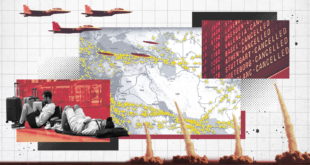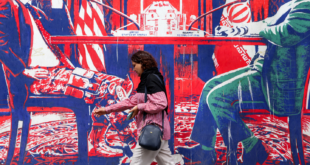 Members of the High Council of Cultural Revolution (HCCR) met the Leader of the Islamic Republic of Iran Ayatollah Sayyid Ali Khamenei on Tuesday, January 3.
Members of the High Council of Cultural Revolution (HCCR) met the Leader of the Islamic Republic of Iran Ayatollah Sayyid Ali Khamenei on Tuesday, January 3.
In an address to the audience, the Leader stated that the issue of public culture is of great significance, and he also referred to the major task of cultural structuring that has been entrusted to the High Council of Cultural Revolution.
“Under the new circumstances, in which the people once again displayed their adherence to Islam, revolutionary values and principles and the ideals of late Imam Khomeini through their massive participation in the recent election, appropriate groundwork has been prepared based on the country’s 20-Year Perspective Document for rectifying cultural trends in the country,” the Leader pointed out.
Ayatollah Khamenei stressed that dynamism, vitality and innovation on the part of the High Council of Cultural Revolution and its ancillary councils are instrumental in achieving the above objective.
Further in his statements, the Leader of the Islamic Republic referred to the deep-rooted religious belief of the Iranian people and their strong faith in the principles of the Islamic Revolution.
“Despite this firmness of belief, appropriate and effective planning is needed to rectify some erroneous cultural trends existing in society that are incongruous with the cultural foundations of the Islamic Revolution,” the Leader told HCCR members.
Ayatollah Khamenei stated that among the major duties of the High Council of Cultural Revolution is to follow up on the cultural ratifications that have already been made.
“Besides offering a blueprint on the cultural structuring of the country and also recommending practicable measures to achieve this objective, the High Council of Cultural Revolution should closely follow up on the ratifications that have already been made until they are carried into effect. This is the reason why the HCCR’s sessions are attended by the heads of three government branches as well as certain ministers and directors of some organizations,” Ayatollah Khamenei noted.
The Leader stated that long-term planning based on prudence and far-sightedness is one of the responsibilities of the High Council of Cultural Revolution. He also advised HCCR members to try to further activate their ancillary councils and utilize experts and scholars in those councils on a full-time basis.
Elsewhere in his remarks, Ayatollah Khamenei stressed that the HCCR should consolidate its ties with the elites and intellectuals at universities and Islamic seminaries, and that it should properly inform elites and intellectuals of its decisions and ratifications.
“Paying greater attention on the part of the HCCR to the advancement of science and the development of scientific theories is among the important issues that can greatly contribute to the country’s scientific progress,” Ayatollah Khamenei observed.
The Leader of the Islamic Republic further stated, “Abundant resources, great capabilities and talented and faithful youngsters have endowed the Islamic Republic of Iran with the ability to become the cradle of science in the Islamic world.”
Ayatollah Khamenei emphasized that the Islamic Iran and also the Muslim Ummah will be able to firmly utter their legitimate and rightful claims in the international arena only when they have attained a high level of scientific progress.
In conclusion, the Leader stated that restructuring the current educational system and amending the existing educational model, paying greater attention to basic and humanity sciences in scientific centers, presenting plans for the production of new cultural products such as appropriate computer games and making special efforts to identify and organize elites and intellectuals with the intention of utilizing this superior class in an optimal manner and fulfilling their requirements are among the important measures that should be taken by the High Council of Cultural Revolution.
President Mahmoud Ahmadinejad, who is also chairman of the High Council of Cultural Revolution, speaking at the meeting, referred to science and culture as the cornerstones of the country’s progress and the main factors contributing to the accomplishment of the goals and objectives envisioned in the country’s 20-Year Perspective Document.
“Considering the great potentials of the High Council of Cultural Revolution, and also in view of the fact that this council has grouped a large number of scholars and intellectuals, the HCCR is determined in its new term to amend educational approaches at all levels and also rectify the cultural trends existing in society,” the HCCR’s chairman told the audience.
President Ahmadinejad further stressed that the High Council of Cultural Revolution would follow up on all cultural ratifications to make sure that they would become operative.
At the meeting, some HCCR members also expressed their views on certain cultural and educational issues of the country.
 Eurasia Press & News
Eurasia Press & News


